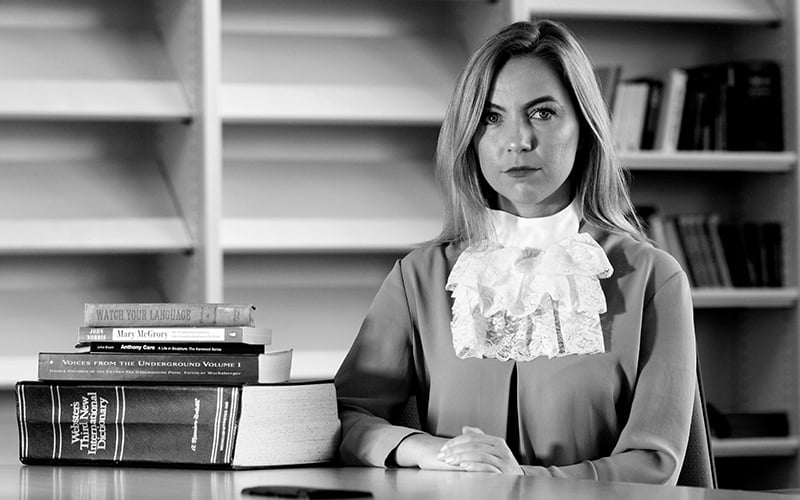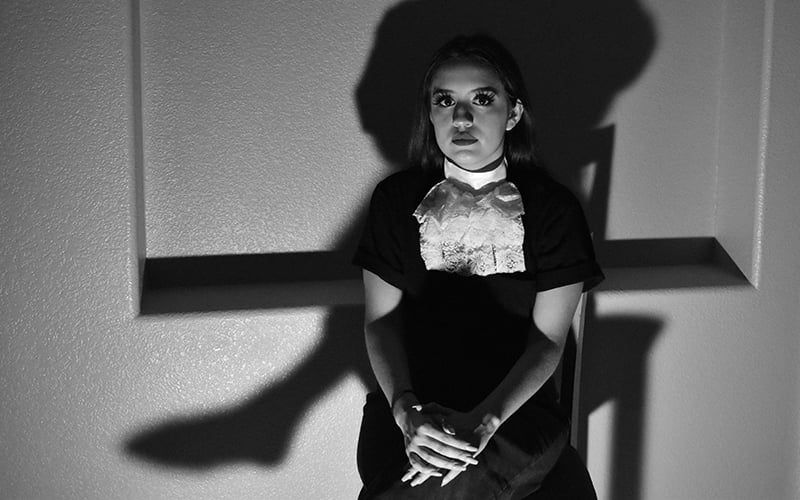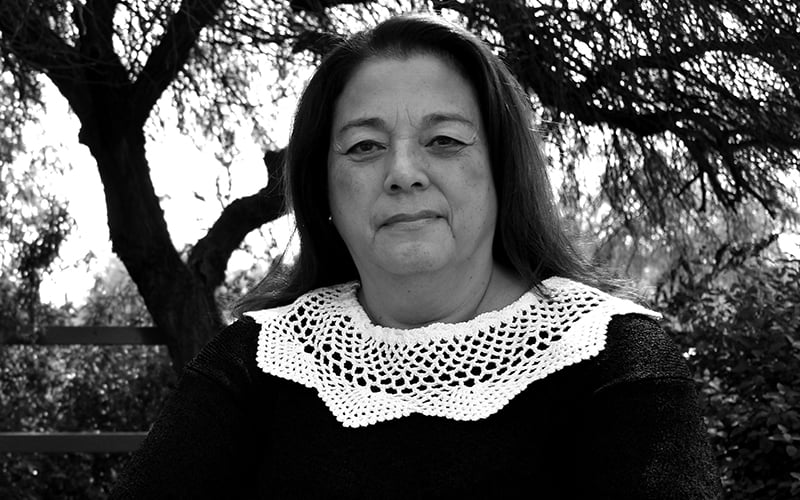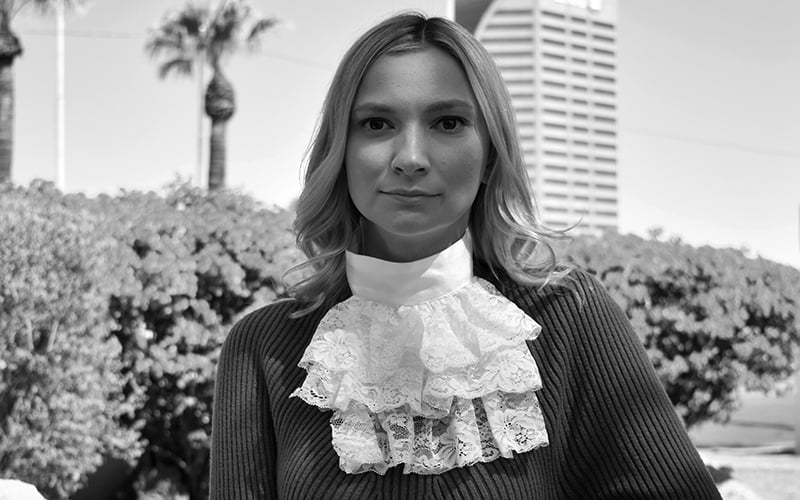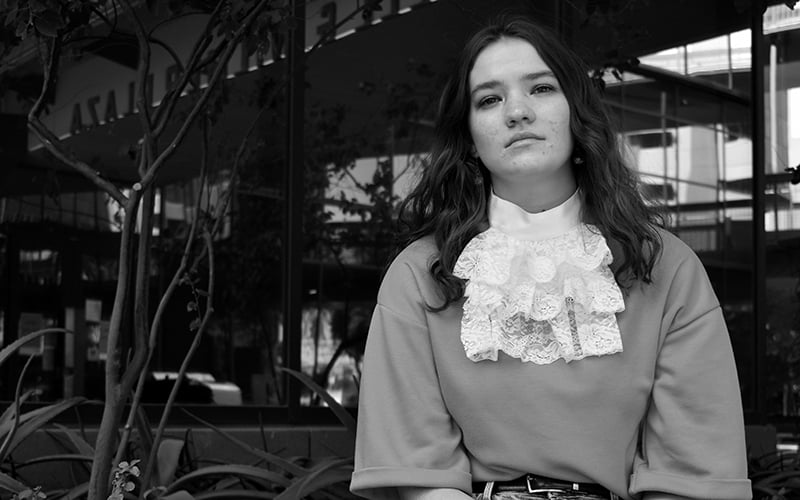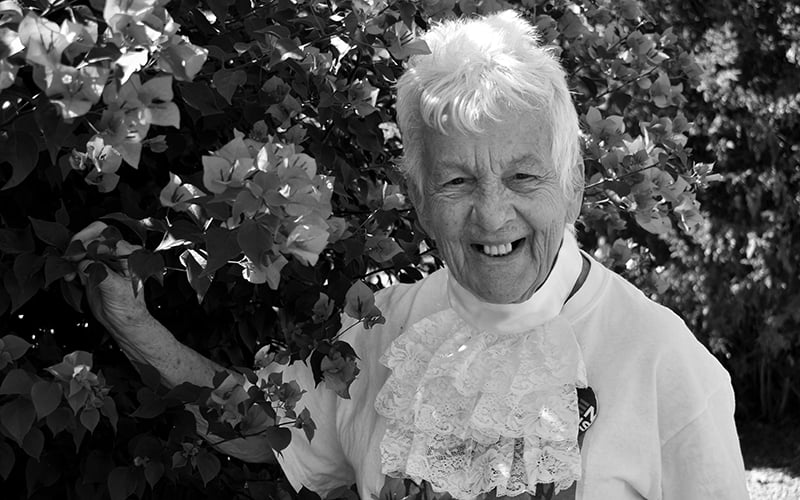- Slug: BC-CNS-Remembering RBG,2810
- 6 photos, audio files for Parker, Alonzo, Castner, Zatezalo, Thompson and Inskeep available. (thumbnails, captions below)
By Hope O’Brien
Cronkite News
PHOENIX – Justice Ruth Bader Ginsburg was a towering figure in the fight against discrimination based on gender, and her death Sept. 18 was a blow to many women who reverently refer to her as the Notorious RBG. On the 3 month anniversary of Justice Ginsburg’s death women across the state continue to remember her legacy.
Cronkite News recently asked six Arizona women to reflect on how their lives have been affected by Ginsburg, 87, who served 27 years on the Supreme Court and was a founding counsel for the American Civil Liberties Union’s Women’s Rights Project Project, which resulted in the high court’s 1971 decision that the Equal Protection Clause of the 14th Amendment applies to women.
Emily Parker
Emily Parker, 29, a law student at Arizona State University with a masters in women’s history, said Ginsburg’s achievements for equality loom large in American history and are especially meaningful for anyone who has worked in women’s rights.
How much did you know about Ginsburg before her death?
During my time in graduate school, I was aware of who she was because her decisions have been very significant in terms of the trajectory of women’s rights and liberties in the United States.
What’s the most important thing for people to know about her?
The ability to complicate her as a person and understand her; not just as a litigator and this women’s rights advocate in her work as a justice, but just the fact that she, in her approach to law, is very complex. She is known in her later years as being a sort of activist justice, which is a phrase that tends to evoke the idea that someone is going out of their way to make changes. Her approach to her decisions was not, “OK, I’m on the Supreme Court, how would I like to remake the law?” Her approach to being on the Supreme Court was to take a precise and exacting approach to the case at bar.
What made her different?
She is unique in the sense that she appealed to people that were really drawn in by her record as a litigator on women’s rights and gender equality issues. But she also was very limited and exacting in the way that she made decisions, which is something kind of often associated with more conservative justices. So I think it’s the fact that she has always made a point in her role as a judge to not say, “OK, we’re going beyond the scope of the question at issue.”
What was your initial reaction to news of her death?
I started crying because this was so horrible and so tragic on so many levels, and after you get through the initial period of being sad about the fact that someone you idolize and looked up to has passed away, obviously concerns about the implications for that in terms of the composition of the court going forward set in. But it is one of those things that you just never forget.
Madison Alonzo
Having grown up in a culture where she says women feel less important than men Madison Alonzo, 20, a first generation Mexican-American and Arizona State University student, said Ginsburg became an example of how women can work past discrimination.
What was her greatest impact on your life?
Coming from a culture that is heavily submissive of women, it was astonishing to see such a strong woman persevere through a male-dominated career. It was comforting to know that there was someone in an influential position in the world that was fighting for me and my rights as a woman.
How much did you know about before her death?
I knew a lot, but quite frankly not enough. She was not heavily mentioned in the public education system, and most of the information I know is because I went out of my way to learn about her. Much like any public figure, after she passed I was brought to light on certain aspects of her life and career that I never knew about prior to her passing.
What inspired you most about Ginsburg?
I loved learning about the endurance and strength she had as a wife, mother and diplomat. She never stopped working and caring for others’ well-being. She exemplifies what it means to be a good person.
What was your initial reaction to news of her death?
I was with a group of friends trying to relieve some of our COVID-19 anxiety and depression when the news hit. When we read the news, we were all scared and heartbroken. I knew what her death would mean for the Supreme Court and for (the Trump) administration and I was scared thinking about what will happen to fundamental rights for minority groups, if a conservative nomination goes through.
Susan B. Castner
Because she was involved in a case against sex discrimination in pay, business owner Susan B. Castner, 66, had a different perspective on the true impact of the work done by Ginsburg, whom she had looked up to for much of her youth.
When was the first time you heard about Ruth Bader Ginsburg?
The first time I heard about her, and you will laugh about this, was a case in 1976 when I had just graduated from college. And the case that drew my interest was somewhere in Oklahoma and it was about beer. It was a law that said that women could buy beer when they were 18, but men had to wait until they were 21, and as a college graduate that was really important to me at the time. And I didn’t even know at the time that Ruth Bader Ginsburg was going to grow into such an icon.
How did she make a difference in your life?
The first house that I ever bought was in 1978 and I bought it with my now husband, but we bought the house as equal partners. And I didn’t know it at the time, but I couldn’t have gotten credit or bought a house if his name wasn’t on the mortgage documents. It is things like that that have changed everything that women take for granted now, and it was because of her.
You were in a case that made law, what did that involve?
I was being paid 30% less than my male predecessor, and because he was violating my civil rights in not paying me equally, in my mind I believed that I deserved an attorney. That is what I eventually made law on was the appointment of counsel as a plaintiff in a Title XII case. So now if you find yourself a victim of sex discrimination, you can site Castner v. Cablevision, and if you meet the full requirements you will have an attorney appointed to you. And I made law on that in the same courtroom that RBG did for the first time and we were both fighting sex discrimination.
Why has RBG had such an impact on history?
I think the fact that if you were a female in the military you didn’t get an equal housing allowance was nuts, and if you look at a lot of laws that she worked on you scratch your head and go “What?”
And it’s that same thing, she looked at them through the lens of how it affected both sexes, and I think that is why she was such a brilliant attorney and justice. I think she knew in her heart of hearts that she wouldn’t make law if she knew it was bad for women, she had to show how it was bad for everybody.
How did you react to news of her death?
I was sitting working on something on a deadline and my husband came in and said, “Ruth Bader Ginsburg just died.” And I put my hands in front of my face and just started screaming, I started howling, and he thought I had a stroke. He said I sounded like a wounded animal. And it wasn’t because of the Supreme Court, not because of this experience that we’re going through right now (the nomination and eventual confirmation of Amy Coney Barrett to the high court), but because she was so amazing.
Mary Zatezalo
Ginsburg played a key role in the life of Mary Zatezalo, 26, an instructor of communications at Gilbert Community College, a small business owner and real estate agent. She said Ginsburg influenced more than just who Zatezalo became, but also her ability as a woman to get to where she is now.
When was the first time you heard of Ruth Bader Ginsburg?
When I was growing up, I was fortunate enough to be raised by strong independent females, so it wasn’t uncommon to have conversations on things going on politically or just things going on in the news. She was a name in my household and I feel very fortunate for that.
Why did RBG become a cultural icon?
To me, (author and activist) Mona Eltahawy talks about how one of the seven necessary sins for women is ambition, and I think that is what RBG demonstrated. She committed her whole life to something that not only was work, but was something that she loved. Being able to exist in the spaces that she did, and especially in regards to femininity in how you can still have a family, have an extremely successful marriage and still be successful in your career. And I think it was one of the first times that we saw a female take that lead role, especially in her family unit, and I think that was really special in what she did.
What is RBG’s greatest impact on your life?
I think about it in terms of independence. Females were kept dependent in order to control, and as soon as just a little bit of wiggle room was given, look at the amazing things that women have achieved in the past hundred years because of women who were able to fight in a public space like her. And there are so many parts of my identity, my career and my existence that I really owe to her.
How did you react to news of her death?
I think she will be one of those people where you remember where you were when she died. At first my reaction was shock because I knew what was going to follow (the fight to replace Ginsburg on the court). So part of me was just distant from it, I didn’t want to talk about it, I didn’t want to explain anything or fight with anyone, and so I took a weekend to just sit with it because I knew what was to follow.
Nora Thompson
With an interest in politics from a young age, Nora Thompson, 21, saw Ruth Bader Ginsburg as a role model in her high school years. She’s now at Arizona State University seeking a career in public service and public policy.
When did you first learn about Ruth Bader Ginsburg?
I grew up in a very politically minded family. So, throughout my whole life I always knew, “Oh yeah, there’s the Supreme Court,” but I think really it was high school. It was specifically this economics class that I took over the summer and I didn’t really learn anything but we talked about the Supreme Court. So, I wrote a paper on the Obergefeld v. Hodges case that legalized gay marriage, and I remember just looking into her more, and I loved her, she was my idol at that point in my life.
What did her seat on the Supreme Court mean for you as a woman?
Seeing Ruth Bader Ginsburg as a lawyer was insane, and it was crazy what the men on the Supreme Court said to her about things that women should and shouldn’t be allowed to do. And she was arguing for women’s rights and for us to be able to do things like take out a mortgage without a husband signing off on it.
And she stood there and held her ground and said, “Actually, it’s ridiculous that we’re not allowed to and women shouldn’t be treated this way and should be treated equally to men.”
What do you miss most about her?
I always thought of her positions in the Supreme Court as a really comforting voice and just as a voice of reason. And though it wasn’t all the time, because I can’t sit here and say to myself that everything she has ever done has been amazing, I think that she was still this guiding light and voice of reason in a very chaotic time and very chaotic society right now.
It was always nice to be like, “Ruth Bader Ginsburg said this very eloquently and very reasonably.” And I think her ability to still be civil with the other people on the Supreme Court will be missed.
How would you like Ginsburg to be remembered?
I hope that we can remember her as the strong woman that fought for equal rights and fought for equal protection. Right now, I think that her death is being overshadowed by whether a new Supreme Court justice should be allowed to be appointed and just everything that is happening in the political world right now.
And I would also want people to remember her as a Jewish woman because there are a lot of things going around about her being up in heaven as an angel, and while it’s all very sweet, it isn’t necessarily the idea of a Jewish afterlife. And so I would want us to remember that she was this big, strong, amazing woman who was also Jewish.
How did you react to news of her death?
I was driving home and so I had stopped to check my phone at a particularly long red light and my mother had texted me “Did you hear about RBG?” And I knew that it couldn’t be good, and when I got the news alert I felt this sadness and emptiness that I feel when a family member passes away. I was left extremely nervous as to what would happen next with the state of the world.
Nan Inskeep
Former registered nurse and women’s health educator Nan Inskeep, 89, watched when Ruth Bader Ginsburg was confirmed and described her confirmation as one that provided relief knowing that women would have a louder voice in the government.
When was the first time you heard the name Ruth Bader Ginsburg?
I am a very political person, and when I was a little girl, my grandfather was Republican and our family was Democrat and so I would always bet him 10 cents on who would win the elections. And so I followed politics, which included the Supreme Court, so I watched all of those votes. Then when our wonderful Ruth Bader came, I knew I could rest easy. I cannot really pinpoint when I first heard of her, but being a woman and watching what she did in the Supreme Court, I knew she was vital to it.
What do you think made her so different?
She was so fair. And interesting about her life is that her best friend on the court was (Justice Antonin) Scalia and he was an arch conservative. They had the opposite swing on every position they held and yet they maintained a friendship through it all, and I think that says something about her, too.
She was so smart and then she used that to further justice, rights, and she was the kind of Supreme Court Justice that every justice should be.
Any advice for the younger generation?
It’s going to be hard. And they are going to grow up without Ruth Bader Ginsburg, they certainly should know about her because she will carry that reputation with her forever and ever. But it’s a matter of what is fair, and as I said she was so fair, they need to look at what is right for everybody and not what is simply right for you.
I want them to remember that she never gave up. And to feel the way you do and to believe in what you are feeling and to stand up for it no matter what. It’s a gift, and not everybody can do it, and hopefully with somebody like her as a mentor, because even though she won’t be here, her teachings, writings and reputation will always be a part of the Supreme Court.
How did you react to news of her death?
Just horror. I remember someone calling to tell me and thinking, “She finally can’t do it anymore.” We watched her go through every single one of those cancers and she could always do it. We watched her go through Harvard for her husband. Oh, my goodness, that woman was exemplary! And yet fair. It was a terrible day for us. But we always know we had a champion.
^__=
Emily Parker poses for a portrait wearing a jabot, which was popularized by the late Justice Ruth Bader Ginsburg. (Photo by Hope O’Brien/Cronkite News)[/caption]
Madison Alonzo poses wearing a jabot, which was popularized by the late Justice Ruth Bader Ginsburg. (Photo by Hope O’Brien/Cronkite News)
Susan B. Castner poses wearing a jabot, which was popularized by the late Justice Ruth Bader Ginsburg. (Photo by Hope O’Brien/Cronkite News)
Mary Zatezalo poses wearing a jabot, which was popularized by the late Justice Ruth Bader Ginsburg. (Photo by Hope O’Brien/Cronkite News)
Nora Thompson poses wearing a jabot, which was popularized by the late Justice Ruth Bader Ginsburg. (Photo by Hope O’Brien/Cronkite News)
Nan Inskeep poses wearing a jabot, which was popularized by the late Justice Ruth Bader Ginsburg. (Photo by Hope O’Brien/Cronkite News)
